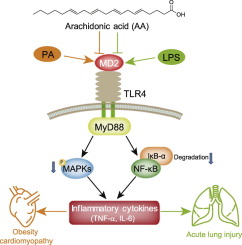当前位置:
X-MOL 学术
›
BBA Mol. Basis Dis.
›
论文详情
Our official English website, www.x-mol.net, welcomes your
feedback! (Note: you will need to create a separate account there.)
Arachidonic acid inhibits inflammatory responses by binding to myeloid differentiation factor-2 (MD2) and preventing MD2/toll-like receptor 4 signaling activation.
Biochimica et Biophysica Acta (BBA) - Molecular Basis of Disease ( IF 4.2 ) Pub Date : 2020-01-14 , DOI: 10.1016/j.bbadis.2020.165683 Yali Zhang 1 , Hongjin Chen 2 , Wenxin Zhang 2 , Yan Cai 3 , Peiren Shan 4 , Di Wu 5 , Bing Zhang 6 , Hui Liu 5 , Zia A Khan 5 , Guang Liang 7
Biochimica et Biophysica Acta (BBA) - Molecular Basis of Disease ( IF 4.2 ) Pub Date : 2020-01-14 , DOI: 10.1016/j.bbadis.2020.165683 Yali Zhang 1 , Hongjin Chen 2 , Wenxin Zhang 2 , Yan Cai 3 , Peiren Shan 4 , Di Wu 5 , Bing Zhang 6 , Hui Liu 5 , Zia A Khan 5 , Guang Liang 7
Affiliation

|
Arachidonic acid (AA) plays a fundamental role in the function of all cells. Metabolites of AA contribute to inflammation as well as for resolving inflammation. Although AA-derived metabolites exhibit well-substantiated bioactivity, it is not known whether AA regulates inflammatory responses independent of its metabolites. With the recent discovery that saturated fatty acids activate toll-like receptor-4 (TLR4), we tested the hypothesis that AA directly regulates inflammatory responses through modulating the activity of TLR4. In cultured cardiomyocytes and macrophages, we found that AA prevents saturated fatty acid-induced TLR4 complex formation with accessory proteins and the induction of proinflammatory cytokines. We discovered that AA directly binds to TLR4 co-receptor, myeloid differentiation factor 2 (MD2) and prevents saturated fatty acids from activating TLR4 pro-inflammatory signaling pathway. Similarly, AA reduced lipopolysaccharide (LPS)-induced inflammation in macrophages and septic death in mice through binding to MD2. In high-fat diet mouse model of obesity and LPS-induced model of acute lung injury, both mediating inflammatory responses through TLR4, treatment with AA prevented MD2/TLR4 dimerization, induction of inflammatory factors, and tissue injuries. In summary, we have discovered that AA interacts with MD2 and disrupts TLR4 activation by LPS and saturated fatty acids. These findings provide experimental evidence for a direct mechanism of AA-induced regulation of inflammation.
中文翻译:

花生四烯酸通过与髓样分化因子2(MD2)结合并阻止MD2 / toll样受体4信号传导激活来抑制炎症反应。
花生四烯酸(AA)在所有细胞的功能中都起着基本作用。AA的代谢产物有助于炎症以及解决炎症。尽管AA衍生的代谢物具有充分的生物活性,但尚不清楚AA是否独立于其代谢物调节炎症反应。随着最近发现饱和脂肪酸激活了Toll-like receptor-4(TLR4),我们测试了AA通过调节TLR4的活性直接调节炎症反应的假设。在培养的心肌细胞和巨噬细胞中,我们发现AA可以防止饱和脂肪酸诱导的TLR4复合物与辅助蛋白的结合以及促炎细胞因子的诱导。我们发现AA直接与TLR4共受体结合,髓样分化因子2(MD2)并阻止饱和脂肪酸激活TLR4促炎信号通路。同样,AA通过结合MD2减少了脂多糖(LPS)诱导的巨噬细胞炎症和小鼠败血症死亡。在肥胖的高脂饮食小鼠模型和LPS诱导的急性肺损伤模型中,两者均通过TLR4介导炎症反应,AA治疗可预防MD2 / TLR4二聚化,诱导炎症因子和组织损伤。总之,我们发现AA与MD2相互作用并通过LPS和饱和脂肪酸破坏TLR4的活化。这些发现为AA诱导的炎症调节的直接机制提供了实验证据。AA通过与MD2结合减少脂多糖(LPS)诱导的巨噬细胞炎症和小鼠败血性死亡。在肥胖的高脂饮食小鼠模型和LPS诱导的急性肺损伤模型中,两者均通过TLR4介导炎症反应,AA治疗可预防MD2 / TLR4二聚化,诱导炎症因子和组织损伤。总之,我们发现AA与MD2相互作用并通过LPS和饱和脂肪酸破坏TLR4的活化。这些发现为AA诱导的炎症调节的直接机制提供了实验证据。AA通过与MD2结合减少脂多糖(LPS)诱导的巨噬细胞炎症和小鼠败血性死亡。在肥胖的高脂饮食小鼠模型和LPS诱导的急性肺损伤模型中,两者均通过TLR4介导炎症反应,AA治疗可预防MD2 / TLR4二聚化,诱导炎症因子和组织损伤。总之,我们发现AA与MD2相互作用并通过LPS和饱和脂肪酸破坏TLR4的活化。这些发现为AA诱导的炎症调节的直接机制提供了实验证据。诱发炎症因子和组织损伤。总之,我们发现AA与MD2相互作用并通过LPS和饱和脂肪酸破坏TLR4的活化。这些发现为AA诱导的炎症调节的直接机制提供了实验证据。诱发炎症因子和组织损伤。总之,我们发现AA与MD2相互作用并通过LPS和饱和脂肪酸破坏TLR4的活化。这些发现为AA诱导的炎症调节的直接机制提供了实验证据。
更新日期:2020-01-14
中文翻译:

花生四烯酸通过与髓样分化因子2(MD2)结合并阻止MD2 / toll样受体4信号传导激活来抑制炎症反应。
花生四烯酸(AA)在所有细胞的功能中都起着基本作用。AA的代谢产物有助于炎症以及解决炎症。尽管AA衍生的代谢物具有充分的生物活性,但尚不清楚AA是否独立于其代谢物调节炎症反应。随着最近发现饱和脂肪酸激活了Toll-like receptor-4(TLR4),我们测试了AA通过调节TLR4的活性直接调节炎症反应的假设。在培养的心肌细胞和巨噬细胞中,我们发现AA可以防止饱和脂肪酸诱导的TLR4复合物与辅助蛋白的结合以及促炎细胞因子的诱导。我们发现AA直接与TLR4共受体结合,髓样分化因子2(MD2)并阻止饱和脂肪酸激活TLR4促炎信号通路。同样,AA通过结合MD2减少了脂多糖(LPS)诱导的巨噬细胞炎症和小鼠败血症死亡。在肥胖的高脂饮食小鼠模型和LPS诱导的急性肺损伤模型中,两者均通过TLR4介导炎症反应,AA治疗可预防MD2 / TLR4二聚化,诱导炎症因子和组织损伤。总之,我们发现AA与MD2相互作用并通过LPS和饱和脂肪酸破坏TLR4的活化。这些发现为AA诱导的炎症调节的直接机制提供了实验证据。AA通过与MD2结合减少脂多糖(LPS)诱导的巨噬细胞炎症和小鼠败血性死亡。在肥胖的高脂饮食小鼠模型和LPS诱导的急性肺损伤模型中,两者均通过TLR4介导炎症反应,AA治疗可预防MD2 / TLR4二聚化,诱导炎症因子和组织损伤。总之,我们发现AA与MD2相互作用并通过LPS和饱和脂肪酸破坏TLR4的活化。这些发现为AA诱导的炎症调节的直接机制提供了实验证据。AA通过与MD2结合减少脂多糖(LPS)诱导的巨噬细胞炎症和小鼠败血性死亡。在肥胖的高脂饮食小鼠模型和LPS诱导的急性肺损伤模型中,两者均通过TLR4介导炎症反应,AA治疗可预防MD2 / TLR4二聚化,诱导炎症因子和组织损伤。总之,我们发现AA与MD2相互作用并通过LPS和饱和脂肪酸破坏TLR4的活化。这些发现为AA诱导的炎症调节的直接机制提供了实验证据。诱发炎症因子和组织损伤。总之,我们发现AA与MD2相互作用并通过LPS和饱和脂肪酸破坏TLR4的活化。这些发现为AA诱导的炎症调节的直接机制提供了实验证据。诱发炎症因子和组织损伤。总之,我们发现AA与MD2相互作用并通过LPS和饱和脂肪酸破坏TLR4的活化。这些发现为AA诱导的炎症调节的直接机制提供了实验证据。










































 京公网安备 11010802027423号
京公网安备 11010802027423号